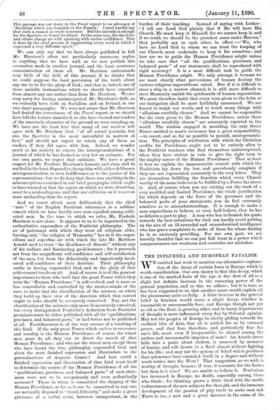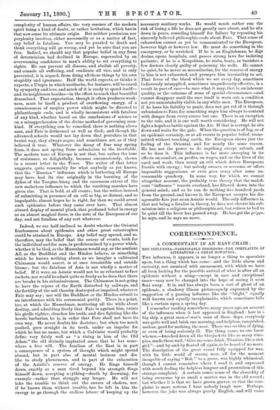THE INFLUENZA AND EUROPEAN FATALISM.
WE omitted last week to mention one alternative explana- tion of the decay of certain fears in Europe which is worth consideration. Our own theory is that this decay, which is one of the marked facts of the age, is due first of all to a slight but definite increase in the reasoning power of the general population, and to this we adhere ; but it is true, as has been suggested to us, that another cause would explain all the phenomena quite as fully. A faint increase in the general belief in fatalism would cause a -slight decay, whether in reasonable or unreasonable fear; and Europe, though not yet as old as the East, is growing older, and in many departments of thought is more influenced every day by Oriental opinion. May not the peoples of Europe be slowly gliding towards the cardinal idea of Asia, that all is settled for us by external power, and that fear, therefore, and particularly fear for one's life, must, even if irrepressible, be classed among the useless and unreasonable impulses of man P An Asiatic never falls into a panic about cholera, is unmoved by menaces of famine, and will drown in a flood almost without fighting for his life ; and may not the system of belief which produces that quiescence have extended itself, in a degree and without much notice, into the West P That suggestion, as we said, is worthy of thought, because, if true, it accounts for the facts ; but then, is it true ? We are unable to believe it. Pessimism has increased in Europe, no doubt, especially among those who think ; for thinking grows a little tired with the multi- tudinousness of the new subjects for thought, and the immense development of the passion of pity tends to make men sad. There is, too, a new and a great increase in the sense of the complexity of human affairs, the very essence of the modern spirit being a kind of doubt, or rather hesitation, which has in that new sense its ultimate origin. But neither pessimism nor perplexity involves, either necessarily or as a matter of fact, any belief in fatalism. You may be puzzled to death and think everything will go wrong, and yet be sure that you are free. Indeed, we should say that popular belief in any form of determinism had declined in Europe, superseded by an overweening confidence in man's ability to set everything to rights. He can prevent all disease, and abolish all poverty, and console all suffering, and eradicate all vice, and is only prevented, it is argued, from doing all those things by his own stupidity and ignorance. Half the world expects, or thinks it expects, a Utopia in which toothache, for instance, will be cured by sympathy and love, and much of it is ready to spend itself— and its neighbours besides—in the effort to reach that beautiful dreamland. That expectation, though it often produces weak- ness, must be itself a product of overflowing energy, of a consciousness of surplus power which might be directed to philanthropic ends, and is wholly inconsistent with fatalism of any kind, whether based on the conclusions of science or on a misapprehension of the divine method of governing man- kind. If everything can be remedied, there is nothing above man, and Fate is dethroned as well as God; and though the advanced schools would not lay down that postulate in that brutal way, they always argue, and sometimes act, as if they believed it true. Whatever the decay of fear may spring from, it does not spring from submission to the inevitable. 'The modern tone of Europe is not that, but rather the tone of resistance, so delightfully, because unconsciously, shown in a recent letter to the Times. The writer of that letter suggests, quite reasonably for what anybody as yet knows, that the " Russian " influenza which is bothering all Europe may have had its rise originally in the bursting of the dykes of the Yangtse-kiang and the enormous extent of the new malaiious influence to which the resulting marshes have given rise. That is bold, at all events ; but the writer, instead of submitting in presence of an evil so big, so distant, and so impalpable, almost hopes he is right, for then we could arrest such epidemics before they came over here. That almost absurd display of mental pluck, that profound belief in energy as an almost magical force, is the note of the European of our day, and not fatalism of any sort whatever.
Indeed, we are half-inclined to doubt whether the Oriental fearlessness about epidemics and other great catastrophes .could be attained in Europe. Any belief may spread, and so, -therefore, may the belief that the course of events, both for the individual and for man, is predetermined by a power which, -whether it be God, as the Mussulman would say, or the sentient All, as the Buddhist and the Hindoo believe, or something which he knows nothing about, as we imagine a cultivated 'Chinaman would assert, is at once irresistible and outside blame ; but the fatalism of Asia is not wholly a matter of belief. If it were, an Asiatic would not be so reluctant to face rockets, nor would he admit quite so freely as he does that there are breaks in his submissiveness. The Chinaman is not going to have the repose of the Earth disturbed by railways, and the fertility of the soil thereby destroyed or impaired, whatever Fate may say ; nor will the Buddhist or the Hindoo submit to an interference with his ceremonial purity. There is a point, too, at which the Mussulman, muttering all the while about destiny, and admitting freely that Fate is against him, twists his girdle tighter, clenches his teeth, and dies fighting like the heroic barbarian he is, in order that Fate shall not have its own way. He never doubts his doctrine; but when too much pushed, goes straight in its teeth, under an impulse for which he has no name, but which a Calvinist would probably define very fairly well as " a rising in him of the Old Adam," the old divinely implanted sense that he has some- where a free will. The fatalism of the East is in part a consequence of a system of thought which might spread abroad, but in part also of mental laziness and dis- like to study phenomena, and in part of the exhaustion of the Asiatic's reserve of energy. He flings himself down, exactly as a man tired beyond his strength flings himself down, accepting anything—death by drowning, for example —rather than struggle any longer. He will not take the trouble to think out the causes of cholera, nor, if he knows them without trouble, has he left in him the energy to go through the endless labour of keeping up the necessary sanitary works. He would much rather run the risk of losing a life he does not greatly care about, and he sits down in peace, consoling himself for failure by repeating his sincerely believed philosophic credo about Fate. That sense of exhaustion cannot as yet be communicated to the European, however high or however low. He must do something in the emergency, or be wretched. If be is an Englishman, he digs drains, opens hospitals, and passes strong laws for isolating patients ; if he is a Neapolitan, he stabs, beats, or banishes a few doctors clearly guilty of poisoning the wells. He cannot be quiet, be he never so necessitarian, for the reserve of energy in him is not exhausted, and prompts him irresistibly to act. That fever of the blood which we see every day, sometimes ludicrously misapplied, sometimes magnificently effective, is a result in part of race—be race what it may, that is, an inherent quality, or the outcome of sons of special circumstance—and cannot disappear until the race itself is worn out, a condition not yet unmistakably visible in any white men. The European, if he loses his liability to panic, does not get rid of it through submission to Fate, for something urges him always to contend with danger from every source but one. There is an exception to the rule, and it is one well worth considering. He will not fight a hopeless battle against the Air. If that is corrupt, he sits down and waits for the gale. When the question is of fog, or of an epidemic certainly, or at all events in popular belief, trans- mitted without touching earth, the European shows just the feeling of the Oriental, and for nearly the same reason. He has not the power to do anything except submit, and so he does it. This influenza is far more annoying in its effects on comfort, on profits, on wages, and on the lives of the aged and weak, than many an evil which drives Europeans frantic with energy ; but nobody swears, or screams, or offers impossible suggestions, or even goes crazy after some un- reasonable quackery. In some way, for which we cannot altogether account, the probably true theory that the malefi- cent "influence " travels overhead, has filtered down into the general mind; and as he can do nothing five hundred yards from the ground, and knows it, the European accepts his dis- agreeable fate just as an Asiatic would. The only difference is, that not being a fatalist in theory, he does not elevate his sub- mission into a religious or philosophic act, but retires to bed to be quiet till the fever has passed away. He has got the grippe, he says, and he says no more.







































 Previous page
Previous page